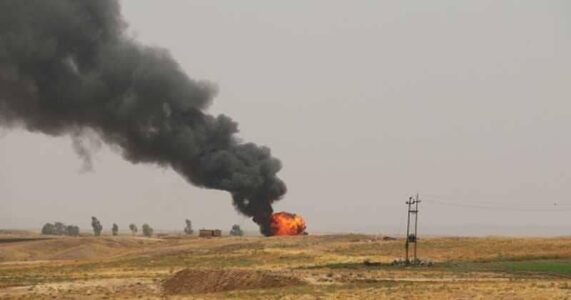
The impact of Islamic State terrorists on Iraq’s oil industry
In June 2014, ISIS (Islamic State of Iraq and Syria) launched an offensive on Northern Iraq, specifically targeting the country’s second largest city- Mosul. ISIS successfully took control of Mosul, and has since been consolidating its power and forces among the Sunni Muslim minority community.
ISIS seeks to establish an Islamic caliphate in the Middle East, primarily in Iraqi and Syrian territory. Driving aggressively towards this goal, ISIS has been recruiting thousands of soldiers to join their military. In order to finance their ambitions, they have been selling oil on the black market.
ISIS has made a strategic move by targeting Iraq. Iraq is well-endowed with natural resources, where in 2011 Iraq’s hydrocarbon industries made up 72% of the country’s total GDP.
The country currently holds the world’s 5th largest proven oil reserves (141 billion barrels) and has been slowly ramping up production since the end of the Iraq War. Moreover, the unstable political environment and political discrimination of Sunni Muslims in Northern Iraq has given ISIS a built-in community from which to recruit fighters and supporters.
Iraq has eight supergiant oil fields. Six of these supergiant oil fields are found in Southern Iraq and account for 60% of the country’s proven oil reserves. The remaining two are located in the north and central part of the country. As of April 2014, Iraq was reported to be producing an estimated 3.3 million barrels per day, making up 4% of the world’s oil supply. Of the 3.3 milllion barrels per day produced, 75% is reported to be produced from the south and 25% from the north and central regions of Iraq.
As of August 2014, ISIS currently controls many Northern and Northwestern provinces of Iraq. Notable cities include: Mosul, Tal Afar, Sinjar, and Fallujah. The city of Zumar and the Ain Zalah oil field in the Kurdistan Regional Government has also recently fallen into their hands. This turn of events is significant as ISIS can leverage their control of the Ain Zalah oil field to sell crude oil on the black market. It has been reported that ISIS is making up to $1 million per day off the sale of Iraqi crude oil — at a rate of $30 USD per barrel — significantly below the market price of ~$100 USD per barrel.
The capture of the Ain Zalah oil field will enable them better funding to launch an offensive for one of Iraq’s largest oil fields- the Kirkuk oil field. After which ISIS is anticipated to consolidate their claims over the northern and Kurdish territories to ultimately head for Baghdad.
A major factor in Iraq’s ability to export its crude oil is through its network of pipelines and ports, which are currently largely unaffected by ISIS.
In terms of ports, ISIS has little interference with this infrastructure. Iraq is able to maintain a business-as-usual scenario since the country exports the majority of its crude oil through its port systems along the Persian Gulf. This is done primarily through the main Basrah Oil Terminal (capacity is an estimated 1.5 million bbl/d) and 5 other ports along the Persian Gulf. In 2012, Iraq upgraded its export capacity by an additional 1.6 million bbl/d via the completion of two mooring systems. The third, and last, scheduled mooring system is reported to be still under construction and would push the country’s export capacity to 4.5 million bbl/d.
In terms of pipelines, ISIS has little control over the current infrastructure until they are able to take control of the Kirkuk supergiant oil field. The Kirkuk oil field is connected to the country’s main export pipeline running from the Kirkuk to Turkey. The pipeline is reported to have a capacity of 1.65 million bbl/d, but is in need of severe maintenance due to neglect reducing its actual capacity to around 600,000 bbl/d. In addition, militant attacks along the pipeline have closed off certain sections.
ISIS taking control of Kirkuk could potentially open this pipeline up to the black market, but they will first have to fight off Kurdish forces first. Iraq’s two other pipelines, located in the West and East, will be a non-issue for ISIS as they have fallen into disuse.
Source: Energy In Asia





